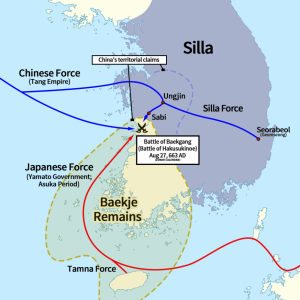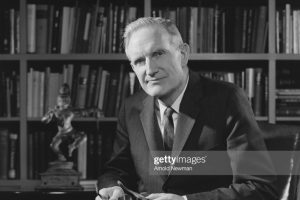The Japanese sense of superiority over the Chinese became established after the victory of the Sino-Japanese War at the end of the 19th century. In the subsequent invasion of China, the slogans were "Boshi Yocho" which means "punish the domineering Chinese," and the Japanese despised the Chinese and called them Shinajin andJapanese soldiers participated in the Chinese front despised Chankoro. After the defeat in 1945, such derogatory words disappeared from the surface of society, but the sources of opposition and hostility imprinted on the Japanese people historically date back to ancient Japan. Looking back at this deep-seated distortion of the view against China, I think the Japanese will put some brakes on their participation in the ongoing Cold War between the United State and China and the US-Europe-Australia-based containment strategy for China.
■ Small empire against the great empire
Kazuhiro Kuramoto, an ancient Japanese political historian, clearly states that "the source of modern Japan's invasion of Asia lies in ancient Wakoku and Japan." ("Ancient History of Japan in War" Gwanggaeto Monument, from Baekgang Shiramura to Toi Invasion Kodansha's New Book)
 Below, I will briefly introduce the final chapter of the book, "History of Japan in War-What Flows in the Deep of Modern Japan," with some personal opinions. Pre-modern Japan and Wakoku had very little experience in foreign war, except for those who repelled the invasion of foreign powers. There are only three examples of actual wars abroad: the battle with Goguryeo in the 5th century, the battle of Baekgang in the 7th century, and the invasion of Toyotomi Hideyoshi in the 16th century.
Below, I will briefly introduce the final chapter of the book, "History of Japan in War-What Flows in the Deep of Modern Japan," with some personal opinions. Pre-modern Japan and Wakoku had very little experience in foreign war, except for those who repelled the invasion of foreign powers. There are only three examples of actual wars abroad: the battle with Goguryeo in the 5th century, the battle of Baekgang in the 7th century, and the invasion of Toyotomi Hideyoshi in the 16th century.
Only the Battle of Baekgang and Hideyoshi's invasion of Korea fought with China. However, the battlefield is on the Korean Peninsula, and there have been no cases of invading China. The Sino-Japanese War and the Russo-Japanese War, which were fought over the modern Korean issue, also made the Korean Peninsula one of the main battlefields. Why did Japan, which had hardly engaged in foreign wars, suddenly start invading Asia in modern times, starting with Korea?
Of course, there is a direct way to clarify the imperialism-oriented approach to seek hegemony in East Asia by the clan government after the "Meiji Restoration." However, its origins are in ancient Wakoku and Japan, and a small empire-oriented approach to the Chinese Great Empire was cultivated and accumulated throughout its long history. Through this, the view of China, the view of Korea, and the view of the enemy country were reproduced many times and planted in the DNA of modern Japanese people.
The keyword is "Dongyi's Small Empire". Japan and Wakoku are lower than the Chinese empire, but higher than the Korean nations, and are said to be small empires that dominate the empire. At first glance, it may seem absurd, but for example, (1) the recognition that Baekje, Gaya, and Silla were made "subjects" from the end of the 4th century to the beginning of the 5th century, and (2) the ruler of Wakoku gave military command to the southern part of the Korean Peninsula in the 5th century. The deep imprint of what was recognized by the Emperor of Song) had a great influence on posterity.
On the other hand, Hidehiro Okada, an expert in East Asian history, summarized the circumstances during this period in his book "The Birth of Japanese History" (Chikuma Shobo) as follows.
"In the middle of the 7th century (660), the Tang Empire united with Silla and destroyed Baekje, an ally of Wakoku. Wakoku sent reinforcements to revive Baekje. Wakoku, who were locked out of the Asian continent and isolated in the sea, gathered to form the first unified kingdom of the Japanese archipelago, Japan. "" National history "Nihon Shoki" to insist on its own identity against China In 720, Japan is a kind of Chinese idea that is in opposition to China and inherits a completely original orthodox nation from heaven. Based on the above, it made it impossible for China and Japan to be compatible, and stipulated the character of Japan for a long time. " Since then, it has been said that "Japan, which is governed by an emperor of all ages, is another empire that opposes the Chinese empire over control of the Korean Peninsula."
Shoin Yoshida was intoxicated and indirectly influenced Shinsaku Takasugi, Genmizu Kusaka, Hirobumi Ito and Aritomo Yamagata, who were former medals of the Meiji era, and is said to have been a must-read for the Meiji Restoration scholars. "Shinron", giving hints to Toshimichi Okubo to relocate to Tokyo, advocating that the conquest of China should be the first step to conquer the world, starting with Manchuria, and is read by supernationalists such as the Japanese Army executives in the Showa period. It can be said that Sato Nobuhiro's "Confused Secret Measures" and "The Principles of the National Athletic Meet" announced by the former Ministry of Education just before the start of the war against the United States are variations of the Japanese version of Chinese thought since "Nihon Shoki".
■ When reversing the sense of superiority
 The wreck of this Japanese version of Chinese thought was the acceptance and defeat of the Potsdam Declaration on August 15, 1945. The Rockefeller Foundation played a major role in the formulation of postwar policy toward Japan during the war in the United States. John Rockefeller III, who visited Japan as a member of a delegation led by John Foster Dulles ahead of the conclusion of the San Francisco Treaty in 1951, had a significant influence on US foreign policy decisions during the war against Japan. Participated in the discussion on the occupation policy for Japan held at CFR. "When occupying Japan, we should take advantage of the disdain for Korea, the superiority complex over China, Russia, and Asian countries, and the strong desire to be treated on an equal footing with Western countries such as the United States and Britain."
The wreck of this Japanese version of Chinese thought was the acceptance and defeat of the Potsdam Declaration on August 15, 1945. The Rockefeller Foundation played a major role in the formulation of postwar policy toward Japan during the war in the United States. John Rockefeller III, who visited Japan as a member of a delegation led by John Foster Dulles ahead of the conclusion of the San Francisco Treaty in 1951, had a significant influence on US foreign policy decisions during the war against Japan. Participated in the discussion on the occupation policy for Japan held at CFR. "When occupying Japan, we should take advantage of the disdain for Korea, the superiority complex over China, Russia, and Asian countries, and the strong desire to be treated on an equal footing with Western countries such as the United States and Britain."
China has now reversed Japan in terms of economic power, military presence, and international voice, and the Japanese have lost their sense of superiority to China. Today, when the US-China Cold War is decisive, Washington takes advantage of the humiliation and antipathy of most Japanese and the desire to regain superiority, making the Japanese government the largest piece of the Chinese siege. I use it only for a limited time. We should now calmly look at the history of Sino-Japanese relations for nearly 2000 years, and seek a new way of peace and coexistence, freed from the anachronistic nationalism of "the battle for hegemony in East Asia" and its feud.
